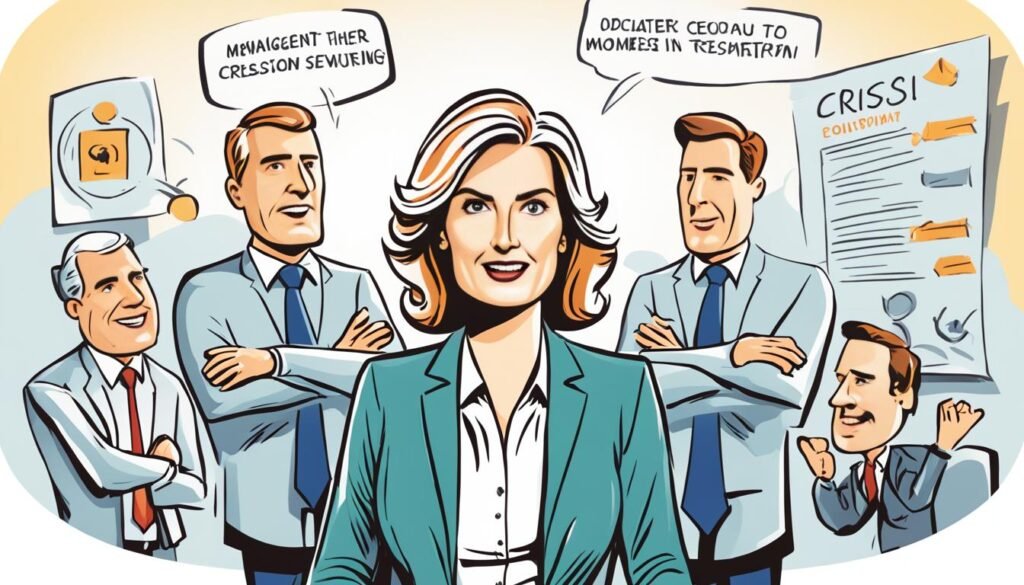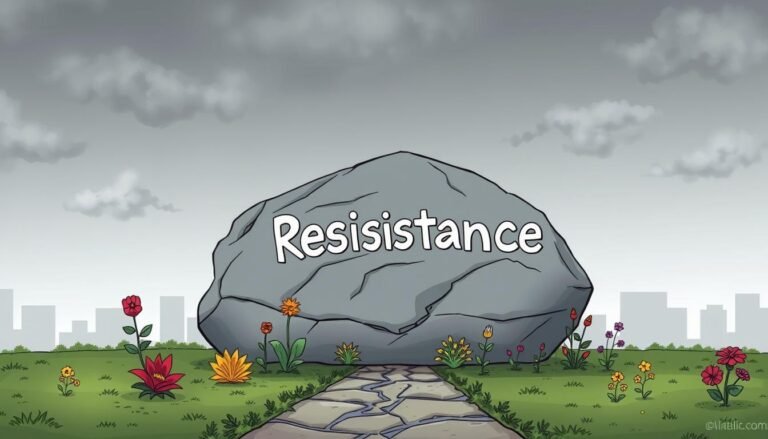Leadership and Crisis Management: Navigating Turbulence
“In the midst of chaos, there is also opportunity.” – Sun Tzu
In times of crisis, effective leadership is key. Leaders must guide through uncertain times. This is crucial for organizations facing unexpected hurdles.
Leadership and crisis management are closely linked. They provide strategies to overcome challenges. Good leaders inspire and support their teams. They turn crisis into chance for growth.
This article reveals the vital qualities of crisis leadership. It offers practical advice for navigating hard times. These insights will help leaders ensure their organizations not only survive but thrive.
Now, let’s explore the key crisis leadership principles. We’ll see how they reveal opportunities in the face of adversity.
Key Takeaways:
- Effective crisis leadership is crucial for navigating turbulent situations and managing challenges.
- Leaders should demonstrate composure, inspire confidence, and maintain transparency.
- Adaptability, empathy, and empowerment are key characteristics of effective crisis leaders.
- Leaders should focus on solutions instead of assigning blame and empower their teams to overcome challenges.
- Learning from crisis experiences and continuous improvement are essential for emerging stronger from adversity.
Maintaining Composure, Inspire Confidence
In crisis times, it’s key for leaders to stay calm and boost confidence. They need to show they’re stable and speak with confidence, even when things are uncertain. Their cool demeanor can inspire and help their team feel more secure.
The way a leader stays calm rubs off on the team. Seeing their leader face challenges with ease and poise makes team members feel safe. Feeling secure, team members can concentrate on their tasks. This helps the team work better together to deal with the crisis.
“Leadership is not about being in control; it’s about being able to navigate uncertainty with grace and inspire others to do the same.” – Robert Smith, CEO of ABC Corporation
Being confident in a crisis is all about how you talk and the decisions you make. Leaders need to tell the team where they’re going and how they’ll handle the crisis. Being straight and giving updates helps build trust and lower stress.
Good leaders get better at handling crises by practicing and learning. By staying calm and boosting team confidence, they can steer their team through tough times. This makes them even stronger when they come out the other side.
Crisis Leadership Skills
| Crisis Leadership Skills | Description |
|---|---|
| Composure | Maintain calmness and stability in challenging situations. |
| Inspire Confidence | Instill a sense of trust and belief in team members. |
| Effective Communication | Transparently share information and provide regular updates. |
| Decision-Making | Make strategic choices to navigate through the crisis. |
Clear, Transparent Communication
In times of crisis, open and honest communication is key. Leaders must keep everyone up-to-date, even with limited info. This openness builds trust and cuts down on fear of the unknown. Giving regular updates, no matter what, shows a clear commitment to sharing the full story.
Being honest helps leaders earn trust and respect from their teams. They share clear, precise details, setting an open atmosphere. This encourages working together to solve problems. It lets team members act with good knowledge during tough times.
Why Transparent Communication Matters
Transparent communication is critical during crises for several reasons:
“Transparent communication builds trust and minimizes uncertainty, allowing team members to feel more informed and empowered during challenging times.”
- It helps build trust and clears up any ongoing uncertainty. This makes team members feel they know what’s going on, even during tough times.
- When leaders give out important information, team members can make smarter decisions. They base their choices on facts, not guesswork.
- Without official news, rumors can cause chaos. Being open helps stop these and makes sure the right info gets through.
- During crisis, employees might worry a lot. Clear communication helps reduce this stress by explaining what’s happening and what to expect.
Leaders can use specific communication methods to stay transparent in crises:
- Regular Updates: Keeping in touch often is vital when things are hard. Leaders should update their teams regularly, even when there’s nothing new. This keeps the focus on being open and keeps everyone in the loop.
- Share Information Candidly: It’s important for leaders to tell both good and bad news honestly. This shows they’re real and builds an open talk culture.
- Listen and Address Concerns: Transparency is not just about sharing info. It’s also about hearing out the team’s worries and fixing them fast. This step builds trust and friendship.
- Provide Context: When the news is tough, leaders should explain why things are happening. This helps the team see the big picture and understand better.
Open communication builds trust, teamwork, and strength. This helps manage crises better and steer teams through hard times.
Adaptability: The Key to Survival
Adaptability is crucial for leaders facing a crisis. They need to be ready for change and think of new answers. This way, they and their teams can tackle tough times and come out better for it.
Embracing Change
Adapting to change is key when managing a crisis. It’s important for leaders to show their teams that change is a chance to improve and be creative. This creates a work culture where being flexible is the norm, making the whole organization stronger against future problems.
Considering Alternative Solutions
When things get rough, leaders should think outside the box. They should encourage their team to brainstorm and find new ways to solve problems. This can lead to fresh ideas and better decisions, even in the face of hard times.
Building Resilience
Being adaptable helps not just during a crisis, but also after. It helps team members feel more ready and skilled to handle what comes next. This prepares them to face future challenges with more confidence.
Adaptability is not about abandoning tried-and-true practices – it’s about knowing when to adapt and being agile enough to stay ahead of the curve. – Mary Jackson, CEO of Jackson Enterprises
Leaders who make adaptability a priority can guide their teams through any storm. They can do this by being open to change, thinking creatively, and by building a strong, flexible team. This way, they can face crises with bravery and grow from the experience.
Empathy and Compassion Matter
It is crucial for leaders to understand the emotional toll of a crisis. They should show empathy and care for their team’s welfare. This involves checking on team members, listening to their worries, and offering help. Doing this builds a sense of unity and trust, especially in hard times.
In a crisis, people feel more stress, anxiety, and worry. Leaders can make a difference by caring and listening. They create a safe space for team members to share their feelings, knowing their emotions are valued.
“Empathy is about standing in someone else’s shoes, feeling with his or her heart, seeing with his or her eyes.” – Daniel H. Pink
Leaders who are empathetic and supportive make their team feel at ease and understood. This can lift morale and make team members more open to sharing their thoughts and concerns.
Besides emotional support, leaders can give practical help during a crisis. This might involve sharing resources or guiding team members in tasks that suit their skills. Showing compassion through actions proves leaders are dedicated to helping their teams overcome challenges.
Examples of Empathy and Compassion in Crisis Leadership
Here are some ways to apply empathy and compassion in leading through a crisis:
- Checking in regularly with team members for their well-being and support is important.
- Being understanding and adapting to team members’ personal challenges shows care.
- Open and honest communication is crucial, keeping everyone informed with updates.
- Providing resources like counseling or wellness programs supports mental health.
- Recognizing and celebrating individual team members’ work during tough times is key.
By showing empathy and compassion in times of crisis, leaders strengthen trust, boost teamwork, and build a resilient work culture.
| Benefits of Empathy and Compassion in Crisis Leadership | Actions to Demonstrate Empathy and Compassion |
|---|---|
| Enhances team morale and well-being | Regular check-ins with team members |
| Improves team collaboration and communication | Show understanding and flexibility |
| Builds trust and loyalty | Open and honest communication |
| Fosters a sense of belonging and psychological safety | Offer resources to support mental and emotional well-being |
Solutions Over Blame
Good crisis leaders know blame isn’t helpful. It doesn’t solve issues or move us forward. They look for solutions and encourage working together. This helps their group beat problems and keep moving.
“The best leaders see blame bring division and slow progress. They focus on solutions to combine our team’s knowledge and build a culture of working together.”
– Jane Bennett, CEO of Solutions Inc.
Working together on problems lets leaders use everyone’s different skills and views. They make a space where sharing ideas is welcome. This way, they use everyone’s smarts and creativity. This leads to new solutions and makes everyone feel like they own the project.
Skilled leaders in a crisis know well to use every resource wisely. They get this by focusing on solving issues, not blaming. This creates a culture of solving problems that makes their group strong in hard times.
Collaborative Problem-Solving in Action
Let’s look at an example:
| Problem | Solution |
|---|---|
| Dramatic decline in sales due to a sudden market shift | Establish cross-functional teams to analyze market trends, identify new target segments, and develop innovative marketing strategies |
| Supply chain disruption | Form a task force comprised of representatives from different departments to assess alternative suppliers, streamline logistics, and implement contingency plans |
| Employee morale decline | Conduct a company-wide survey to understand employee concerns, and then implement initiatives such as flexible working hours, professional growth opportunities, and recognition programs |
In these examples, leaders chose to find solutions instead of blaming. They worked with their teams. And together, they successfully tackled these tough times and came out stronger.
In the end, true crisis leaders focus on solutions, not blame. They inspire their teams to work together. This not only helps their groups through tough times but also sets them up for future achievements.
Empower and Delegate
Leading in a crisis isn’t a solo job. It’s about sharing the load through empowerment and delegation. This means letting team members tackle tasks that match their skills. Leaders do this to make everyone feel important and motivated. It also helps get the work done, spreading it out more evenly.
When tasks are handed out, it’s key to be clear and supportive. Leaders set goals everyone can aim for together. They also make sure their team has what they need. This support boosts their confidence and helps them perform well in their roles.
Good leaders also give their team space to act on their own. They trust that their team knows what to do. This trust allows team members to act fast and smart when things change. It gives them the chance to shine without needing someone always watching.
“By empowering and delegating, leaders unlock the full potential of their team members. They create an environment that promotes collaboration, innovation, and growth, where each individual feels valued and empowered to contribute their unique expertise and skillset.”
When team members have the power and the right tasks, they step up. They feel like they own their work. This pushes them to work even harder. They not only share the stress but also get to show off their leadership skills.
Creating a culture of empowerment helps leaders get better at guiding during crises. It also helps their team become stronger. They become more sure of themselves and ready for whatever comes next.

| Benefits of Empowerment and Delegation in Crisis Leadership | |
|---|---|
| 1. Lightens the leader’s workload | |
| 2. Fosters a sense of value and purpose in team members | |
| 3. Promotes collaboration, innovation, and growth | |
| 4. Develops leadership skills in team members | |
| 5. Cultivates a resilient and high-performing team |
Learning from Crisis
After a crisis, great leaders know to look back and learn. They talk with their teams to get feedback. This helps them understand what they did well and what they could have done better.
By analyzing the crisis, leaders can see where they excelled and where they need to improve. This thinking helps them get ready for the next challenge. They learn a lot about what they can do.
“Reflecting on success and mistakes is key to learning. It helps leaders see new chances and fresh views.”
Listening to their team is important for leaders after a crisis. Team members offer different ideas and views. This feedback helps leaders see the big picture and find ways to get better.
Getting better never stops for good leaders. They use what they’ve learned to improve. This way, they’re more ready for any future hardships. Their dedication to getting stronger helps their whole team.
Learning after a crisis makes leaders tough and flexible. They show they are always working to get better. This is good for them and everyone they lead, helping to overcome tough times.
Key Benefits of Learning from Crisis:
- Enhanced self-awareness and understanding of leadership capabilities
- Identification of strengths and areas for development
- Deeper insights into the impact of leadership decisions and strategies
- Opportunities for learning and gaining new perspectives
- Improved crisis leadership skills and strategies
- Increased resilience and adaptability for future crises
Learning, thinking, and improving turn crises into valuable lessons for leaders. They become stronger and more skilled for future tests. Applying their new insights makes them better leaders.
| Benefits of Learning from Crisis | Key Insights |
|---|---|
| Enhanced self-awareness | Understanding of one’s own leadership capabilities and areas for development |
| Identification of strengths and weaknesses | Recognition of areas where current crisis leadership strategies were effective and areas for improvement |
| Deeper insights into leadership impact | Understanding of how leadership decisions and strategies influenced the crisis situation and its outcomes |
| Opportunities for learning and gaining new perspectives | Discovery of hidden or alternative solutions, perspectives, or approaches that were not initially considered |
| Improved crisis leadership skills | Refinement and enhancement of crisis leadership capabilities and strategies |
| Increased resilience and adaptability | Development of the ability to navigate future crises with greater confidence and agility |
Learning from crisis is a big part of leading well. By reflecting and learning, leaders get better. Their teams become more resilient and can succeed despite hard times.
Crisis Leadership: Emerging Stronger
In hard times, good leaders do more than survive. They make their teams and organizations stronger and ready for future challenges. They do this by showing resilience, keeping communication open, and focusing on answers. This helps them lead through crises and inspires their teams.
Resilience is critical for both leaders and their teams. It means showing strength and not giving up when things get tough. Leaders who are resilient keep a positive outlook, adapt to change, and grow from setbacks.
Talking openly is crucial during a crisis. Leaders should create a culture of openness and honesty. They need to share information promptly to help their teams understand the situation. This trust and clear communication help everyone work together better.
Fostering a Culture of Empowerment
Empowering team members is vital in crisis leadership. Leaders should let others make decisions and take charge of tasks. This helps lighten the leader’s load and uses everyone’s skills. It also gives team members a sense of ownership and responsibility, making the team stronger as a whole.
“The measure of greatness in crisis leadership is not only how well you manage the situation, but how well you empower and inspire those around you.” – Simon Sinek
Being focused on solving problems is key. Crisis leaders look for ways to fix issues rather than blame people. They encourage everyone to think about the future and work together to find answers. This approach encourages creativity and innovation.
Building Resilience and Effectiveness
Taking on crisis leadership can have major, positive effects on a team’s resilience and success. Leaders help their teams face challenges, inspiring them to find their strength and learn new skills. This not only helps the team get through the crisis but also makes them stronger for future problems.
To sum up, leading in a crisis is about more than just getting by. It’s about getting stronger. By showing resilience, keeping the lines of communication open, empowering their teams, and focusing on solutions, leaders can guide their groups effectively. This kind of leadership helps teams and organizations not just survive but thrive in the face of hard times.
Conclusion
In today’s world, being a good crisis leader is more critical than ever. Strong leaders use many skills and tools to guide their teams through hard times. They stay calm and keep everyone informed, which makes their team feel secure. They also adapt and show they care, helping everyone stay strong and united.
Hard times can be important lessons for leaders. By looking back on tough situations, they learn how to do better in the future. Getting through a crisis doesn’t just keep the company going. It also helps the team become stronger and more ready for whatever comes next.
Good crisis leaders can help their organizations grow after facing challenges. They use things like staying calm, being honest, adapting, showing empathy, and trusting their team. Leading through hard times is about more than just making decisions. It’s also about always learning and finding ways to get better. So, knowing how to lead in a crisis is key to being a great leader in our ever-changing world.
FAQ
What is the importance of effective crisis leadership in navigating turbulent times?
Effective crisis leadership is key in tough times. It ensures an organization stays stable and inspires confidence. Leaders help their teams adapt and come out stronger.
How can leaders maintain composure and inspire confidence during times of crisis?
Leaders stay calm and positive to inspire trust. They use a steady, reassuring voice. This makes their teams feel safe.
Why is clear and transparent communication vital in times of crisis?
Clear talk and honesty during crises build trust. Even with little info, updating regularly shows you’re open. It helps people understand what’s going on.
What is the key to effective crisis management?
Being able to adapt is crucial in crisis management. Leaders must be open to new ideas. This way, they can overcome sudden challenges and make their team stronger.
How can empathy and compassion contribute to crisis leadership?
Showing you care helps everyone feel part of the team. Leaders should check on their team, listen, and offer help. These are vital for leading through hard times.
How should leaders approach problem-solving during a crisis?
Good leaders look for solutions, not someone to blame. They focus on moving forward as a team. This approach helps overcome challenges.
What role does empowerment and delegation play in crisis leadership?
Leaders use empowerment and delegation to let their team shine. They assign tasks by what the team does best. This gives everyone value and helps them step up.
Why is it important to learn from crisis experiences?
Learning from past crises helps leaders improve. They see what to do better next time. This makes them stronger leaders.
How can crisis leadership lead to transformative impacts?
By being resilient and open, crisis leadership can transform teams. It makes them stronger and more effective. This leads to recovery and growth after hard times.
What is the key takeaway about crisis leadership and navigating turbulent times?
Useful crisis leadership uses key strategies to navigate hard times. These include staying calm, talking honestly, being ready for change, caring for your team, and letting them shine. This helps organizations come out of crises stronger.
Source Links
- https://www.linkedin.com/pulse/crisis-leadership-navigating-turbulence-grace-dr-alaa-mohd?trk=article-ssr-frontend-pulse_more-articles_related-content-card
- https://medium.com/@small_town/crisis-leadership-navigating-turbulent-times-2fea4a845dd4
- https://m.economictimes.com/jobs/c-suite/crisis-leadership-strategies-for-navigating-turbulent-times/articleshow/104625755.cms








